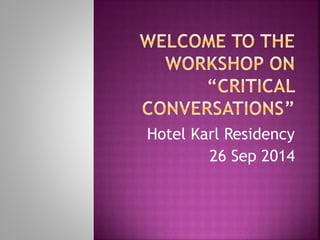On Handling Critical conversations
•Descargar como PPTX, PDF•
3 recomendaciones•848 vistas
Denunciar
Compartir
Denunciar
Compartir

Recomendados
Recomendados
Interpersonal & influencing skills
Presented by David Rodgers
APM PMO SIG conference 19 October 2017Interpersonal & influencing skills, David Rodgers, APM PMO SIG conference 2017

Interpersonal & influencing skills, David Rodgers, APM PMO SIG conference 2017Association for Project Management
We often interact with difficult people, be it our boss, co-workers or customers.
The way we handle them can affect our job, our advancement, and even our health.Dealing With Difficult People 

Dealing With Difficult People We Learn - A Continuous Learning Forum from Welingkar's Distance Learning Program.
Más contenido relacionado
La actualidad más candente
Interpersonal & influencing skills
Presented by David Rodgers
APM PMO SIG conference 19 October 2017Interpersonal & influencing skills, David Rodgers, APM PMO SIG conference 2017

Interpersonal & influencing skills, David Rodgers, APM PMO SIG conference 2017Association for Project Management
We often interact with difficult people, be it our boss, co-workers or customers.
The way we handle them can affect our job, our advancement, and even our health.Dealing With Difficult People 

Dealing With Difficult People We Learn - A Continuous Learning Forum from Welingkar's Distance Learning Program.
La actualidad más candente (20)
Interpersonal & influencing skills, David Rodgers, APM PMO SIG conference 2017

Interpersonal & influencing skills, David Rodgers, APM PMO SIG conference 2017
Security Administration Iii 5 Interpersonal Communications

Security Administration Iii 5 Interpersonal Communications
How to recognize and minimize unconscious bias in the workplace

How to recognize and minimize unconscious bias in the workplace
Destacado
Destacado (10)
Similar a On Handling Critical conversations
Similar a On Handling Critical conversations (20)
2015-04-23 The Courage to Communicate - Effective Leadership

2015-04-23 The Courage to Communicate - Effective Leadership
Respectfulworkplace forees-130115090711-phpapp01[1]![Respectfulworkplace forees-130115090711-phpapp01[1]](data:image/gif;base64,R0lGODlhAQABAIAAAAAAAP///yH5BAEAAAAALAAAAAABAAEAAAIBRAA7)
![Respectfulworkplace forees-130115090711-phpapp01[1]](data:image/gif;base64,R0lGODlhAQABAIAAAAAAAP///yH5BAEAAAAALAAAAAABAAEAAAIBRAA7)
Respectfulworkplace forees-130115090711-phpapp01[1]
Heroic Journeys: Working with Resistant Clients and Families

Heroic Journeys: Working with Resistant Clients and Families
Más de Nandu Warrier
Más de Nandu Warrier (20)
Workshop on personal productivity at hotel keys nestor

Workshop on personal productivity at hotel keys nestor
Workshop on personal productivity at hotel keys nestor

Workshop on personal productivity at hotel keys nestor
On Handling Critical conversations
- 1. Hotel Karl Residency 26 Sep 2014
- 2. “The single biggest problem in communication is the illusion that it has taken place” George Bernard Shaw
- 3. Be Able to Define What a Critical Conversation is. Know Your Style Under Stress Have a Basic Understanding of the Critical Conversations process Understand how well- handled Critical Conversations enhance personal productivity and productivity at the workplace
- 4. Research has revealed that most organizations are losing between 20 and 80 percent of their potential performers because of leaders’ and employees’ inability to master critical conversations Poorly handled critical conversations have resulted in: Sapping of organizational performance by 20 to 50 percent Accounted for up to 90 percent of divorces.
- 8. Opposing opinions Critical Conversations Strong Emotions Critical Conversations High Stakes
- 9. Ending a relationship Talking with a coworker who behaves offensively Asking a friend to repay dues Giving a boss feedback about his behaviour Dealing with a rebellious teen Talking to a team member who is not keeping commitments Discussing problems related to intimacy
- 11. Missed deadlines Broken rules Failed promises Bad behaviours Breach of contracts Not walking the talk
- 12. Permanent resolutions to failed promises and missed deadlines Transform broken rules and bad behaviours into productivity and accountability Strengthen relationships Solve problems
- 13. Avoid Face them- handle them well Face them- handle them poorly
- 14. Silently?
- 15. Dropping hints? Changing subject? Not replying? Withdrawing from the interaction? Just going along Sugarcoat Sulk
- 16. Fact free planning AWOL sponsors Project chicken Skirting the issue Team failure
- 17. Or-- Violently?
- 18. Cutting people off? Overstating arguments? Attack ideas? Harsh debate tactics? Insults and threats? personal attacks?
- 20. Spot the conversations that are keeping you stuck
- 24. Before- identify the right problem and take charge of your emotions During- describe the problem, decide if it is motivation/ ability/ both make it easy and motivating, stay on track After- decide if the problem is resolved, set action plans, follow up
- 25. If the problem is small If the problem wont happen again If the problem does not have a significant impact If no one else cares one way or the other
- 26. If by not talking about it you will act about it You have a pattern of going into silence You are telling yourself you are helpless You are struggling with your conscience You deeply care about it
- 27. “Its not how you play the game- its how the game plays you”
- 28. Manage yourself Focus on what you really want Refuse the fools choice
- 29. Look for signs when the conversation is going to turn crucial Body language Tone Expressions Style under stress
- 30. Apologies Contrast Mutual purpose
- 31. The stories we tell ourselves about others are critical We are a narrative people Knowing our stories keeps our hearts and minds in control Avoid fundamental attribution error Analyse your stories Identify your role in the problem/solution
- 32. Speak persuasively not abrasively Start with safety Ask for facts Avoid emotional or sensitive words Share your story End with a question- “what exactly happened?”
- 33. Make things motivating-motivation= productive energy Avoid use of power unless unavoidable Clarify natural consequences Link to a persons sense of self Show a mirror Connect to existing carrots and sticks focus on long term benefits
- 34. Who What When Follow up( on the precise issue)
- 35. What about the more difficult cases??
- 36. “Our lives begin to end the day we are silent about things that matter” Martin Luther King Jr
